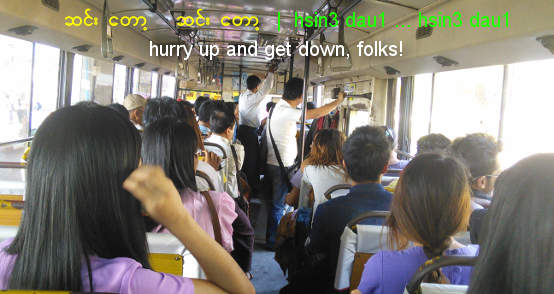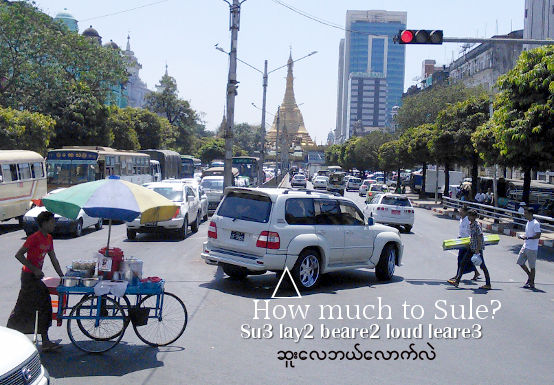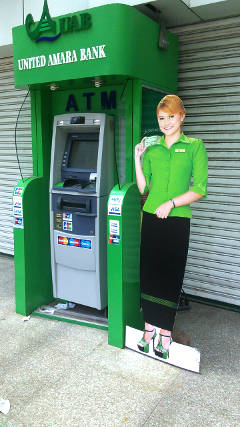Locations and Directions
So far, we have been building up on the basic Burmese sentence constructions and learning some Burmese culture along the way. You will not be speaking true Burmese if you attempt to make a direct translation from an another language using a dictionary.
Deep inside each of us, there are universal human feelings, emotions, wants, needs, likes and dislikes. Those primary direct experiences from the within seem to exist even if we don't use any words to describe them. We use language to code and decode those fundamentals so that we can communicate with the others. After coding those "inner feelings" into words, however, the direct translation of words into an another language using a dictionary doesn't always fully capture the original "inner experiences" that we would like to articulate. Why?
Maybe that's because our usage of the words depends on how we see the world, our attitudes, how we relate to each other, our way of life and daily activities, the weather and the environment, what we consider as appropriate or inappropriate, important or not important; and they are different from culture to culture.
When a neighbor greets me: beare2 leare3
![]() — Go where? (where + ?), I doubt that he is really interested in where I am going, just like when you say "How are you?", you say it without thinking too deeply about the state of well-being of the other person.
— Go where? (where + ?), I doubt that he is really interested in where I am going, just like when you say "How are you?", you say it without thinking too deeply about the state of well-being of the other person.
But, there is something more fundamental — that "inner feeling" and "intention" behind that greeting. Here, you want to express your friendliness, and also to some degree you feel awkward if you don't say something that the society expects you to say. Since this is the case, the two greetings are equivalent in terms of "inner feelings".
That is why I have been using two translations side by side: "inner feeling" as well as direct translation word by word so that you can grasp both the overall feeling tone and meaning of each word in the sentence.
Straight in front
teare1-deare1 — straight.
teare1-deare1 hma2 — (It's) located straight ahead. (straight + at)
teare1-deare1 thwa3 — Go straight ahead. (straight + go)
a-shay1 hma2 — (It's) in front. (front + at)
a-shay1 toe3 — Move forward. (front + inch forward)
At the back
a-nout hma2 — (It's) at the back (back + at)
a-nout hsoat — Move back; reverse the car (back + retreat)
hsoat, hsoat, hsoat — Parking attendant telling the driver it's OK to reverse. (retreat + retreat + retreat)
teare1-deare1 hsoat ... teare1-deare1 hsoat — Parking attendant telling the driver to back up straight.
ho3! — Parking attendant telling the driver to stop. (Derived from either the English word: "halt" or Hindi word "Hoe".)
hma2 is the postpositional marker equivalent to English preposition "in", "on", "at". In burmese it goes after the place or location word.
Go up
a-pau2 hma2 — (It's) up there. (up + at)
a-pau2-zone3 hma2 — (It's) at the uppermost level. (up + extreme position + at)
a-pau2 htut hma2 — (It's) upstairs. (up + floor or level + at)
a-pau2-zone3 htut hma2 — (It's) on the top floor. (up + extreme position + floor or level + at)
a-pau2-zone3 a-hsin1 hma2 — (It's) on the top shelf. (up + extreme position + "shelf" + at)
za1-bweare3 pau2 hma2 — (It's) on the table. (table + on top + at)
lun3 pau2 hma2 — (It's) on the road. (road + on + at)
thit-pin2 pau2 hma2 — (It's) in the tree. (tree + on + at)
a-pau2 tet — Go up! (up + climb)
toun2 pau2 tet — Climb the mountain. (mountain + up + climb)
thit-pin2 tet — Climb the tree. (tree + climb)
ka3 pau2 tet — Go inside the car! (car + on top + climb)
No, it doesn't mean go up the roof of the car! In the old days, people used to go up the cart pulled by two bullocks; there is no "inside" of the cart to speak of.
tet ome3 .. tet ome3 — Go up! Go up! (climb + "do this action first")
Bus ticket conductor saying people are still going up (or) telling people to go up. It's hard to say whether he is talking to himself, to the passengers, or to the driver. Fortunately, the days of pushy bus ticket conductors are over with the new YBS system which runs without them like the rest of the world.
a-pau2 htut tet ya1 meare2 — (You / We) need to go upstairs. (up + floor or level + climb + obtain + going to)
a-pau2 htut tet ja1 zo1 — Let's go upstairs. (up + floor or level + climb + let's)
Down there!
out hma2 — (It's) down there. (down + at)
out-hsone3 hma2 — (It's) at the lowest level. (down + extreme position + at)
out-htut hma2 — (It's) downstairs. (down + floor or level + at)
out hsin3 meare2 — go down as in "I am going downstairs." (down + go down / alight from vehicle + going to)
out hsin3 ya1 meare2 — (You) need to go down. (down + go down + obtain + going to)
hsin3 meare2 — go down as in "I am going down from the bus." (go down + going to)

hsin3 dau1 .. hsin3 dau1 — Bus ticket conductor telling people to get down. (go down + about time)
hsin3 dome3 .. hsin3 dome3 — Bus ticket conductor telling the driver people are still going down.(go down + still in the action)
Why doubling and repeating words? Probably because of the noise level in the busy city center, words need to be repeated to be heard. In comparison, in Bahasa Malaysia or Indonesia, words are repeated to make them plural. For example, "Orang, orang" for people where "orang" stands for a single man in Malay/Indonesian language.
In Mandarin Chinese, words are sometimes doubled up for different reasons. "Ke3 yi.. Ke3 yi" to stress from "can" to a more enthusiastic "Of course, you can.."
The middle way
a-leare2 hma2 — in the middle. (middle + at)
a-leare2 htut hma2 — on the 2nd level of 3 storey building. (middle + floor or level + at)
a-leare2 dun3 — middle school; junior high. (middle + class/form/grade)
On your right
nya2 bet hma2 — On your right. (right + direction + at)
nya2 bet kway1 — Turn right! (right + direction + turn)
nya2 bet a-soon2-zone3 hma2 — At the extreme right position.(right + direction + extreme position + at)
The corner
nya2 bet doun1 — at the right corner, as in soccer corner kick. (right + direction + corner)
lun3 doun1 hma2 — in the street corner. (road + corner + at)
Left side
beare2 bet hma2 — On your left (left + direction + at)
beare2 bet kway1 — Turn left (left + direction + turn)
beare2 bet a-soon2-zone3 hma2 — at the extreme left position. (left + direction + extreme position + at)
beare2 bet doun1 — at the left corner, as in soccer corner kick. (left + direction + corner)
Going out
a-pyin2 hma2 — outside. (outside + at)
a-pyin2 thwa3 meare2 — go out as in "I am going out." (outside + go + going to)
a-pyin2 htwet thwa3 deare2 — go out as in "He went out." (outside + exit + go + affirmative)
Inside
a-hteare3 hma2 — inside. (inside + at)
a-khan3-hteare3 hma2 — inside the room. (room + inside + at)
ain2-hteare3 hma2 — inside the house. (house + inside +at)
ate-hteare3 hma2 — inside the bag. (bag + inside + at)
ka3-hteare3 hma2 — inside the car. (car + inside + at)
chan2-hteare3 hma2 — in the backyard. ( backyard where you grow vegetables or raise livestocks + inside + at)
hteare3 from the word a-hteare3 meaning "inside" is used as suffix to nouns. It is a postpositional marker in Burmese grammar and must still be followed by hma2.
North, East, South, West
a-shay1 — East. (same meaning as "the front")
a-nout — West. (same meaning as "the back")
toun2 — South.
myout — North.
A Tourist Story
Taxi driver:
hsa1-ya2 — Sir
beare2 — where
thwa3 — go
ma1-leare3 — ? ( will + ?)
hsa1-ya2 beare2 thwa3 ma1 leare3 — Where are you going, Sir?
Tourist:
hsu3-lay2 — Sule Pagoda
lite — to come along
ma1-la3 — ? (will + ?)
hsu3-lay2 lite ma1-la3 — Sule Pagoda, are you going?
Alternatively, you can say,
hsu3-lay2 beare2-lout leare3: "How much to Sule?"

Taxi driver after scratching his head:
thone3 htoun2 — 3,000
beare3 — only; just
pay3 — to give
ba2 — polite
thone3 htoun2 beare3 pay3 ba2 — Pay me only 3,000.
Tourist :
ha2... — C'mon
thone3 htoun2 — 3,000
mya3 — too much
deare2 — ending word.
ha2... thone3 htoun2 mya3 deare2 — C'mon... 3,000 is too much.
Tourist continues:
hna1-htoun2 — 2,000
loat — to make or to do
ba2 — polite suggestion.
hna1-htoun2 loat ba2 — Please make it 2,000.
Taxi driver scratches his head again, thinks about it for a while, and gestures towards the back seat:
Tet, Tet.. Alright, have a seat.. (go up + go up)
The Toyota taxi (recently imported new model) is modified to run by Compressed Natural Gas (CNG). After about 15 minutes drive, the taxi stops in front of the parking lot near Sule Pagoda.
The tourist had studied the map of down-town Yangon the night before, but now he is a bit confused as to which road around the Sule Pagoda he should be heading. He decides to ask for direction with his recently-acquired knowledge of Burmese language he learned from some Internet website.
People in Yangon must be very friendly. Someone approaches to him first even before he asks for help. Let's see what this friendly Myanmar man has to say.
Friendly Myanmar Man :
hsa1-ya2-ji3, — Big Master (master + big)
dau2-la2 — dollar
leare3 — exchange
ma1-la3 — ? (will + ?)
hsa1-ya2-ji3, dau2-la2 leare3 ma1-la3 — "Do you want to exchange dollar, big master?", the man in traditional lone2 ji2 (sarong) asks the tourist.
The tourist has never heard of this kind of greeting before. He decides that he will exchange a conversation with this friendly Burmese man.
Nearby street vendor quickly takes advantage of the fact that the tourist can speak a pretty good Burmese, with the
right tone and all.
Street Vendor :
a-khway2 — tapes, VCD, DVD etc.
dway2 — plural
kji1 — to watch
ba2 ome3 — polite suggestion
a-khway2 dway2 kji1 ba2 ome3 — "Won't you watch movies?" The street vendor helds up a transparent plastic VCD cover with interesting color print inside.
ta1-khway2 — one tape (one + tape)
nga3 ya2 — 500
ba2 — polite ending word.
ta1-khway2 nga3 ya2 ba2 — "500 kyat each", he says in a salesman pitch.
Tourist :
ma1 — not
weare2 — buy
thay3 — yet to be; not yet
bu3 — negative ending
ma1-weare2 thay3 bu3 — Not buying this time!
The Adventure of the tourist continues in lesson 6.
Footnote:

June 2012 update: You will be seeing less and less of street-vendors in downtown yangon. Commercial banks have now replaced the illegal money exchangers of the past. You can use ATM to withdraw local currency in Kyats if you have foreign-issued credit or debit cards with Visa and MasterCard Networks.
The new civilian government has started to clean up the congested side-walks in the streets of downtown Yangon. New shops and buildings are slowly replacing the old. You will now see luxury vehicles on the road after import permits were issued in September 2011.
March 2014 update: The above photo with Sule Pagoda in the background was added.
May 2015 update: This photo of United Amara Bank ATM machine at Bargayar Street, Myaynigone, Yangon.
January 2016 update: Street vendors are back due to lack of enforcement. Expect traffic jams in day time.
January 2017 update: On January 16, 2017 a new bus system with new numbers were introduced in Yangon. Air-conditioned new buses imported from China are now abailable in some routes.See the routes with all the bus stops and detailed maps at http://ygnbusdirectory.com/.
